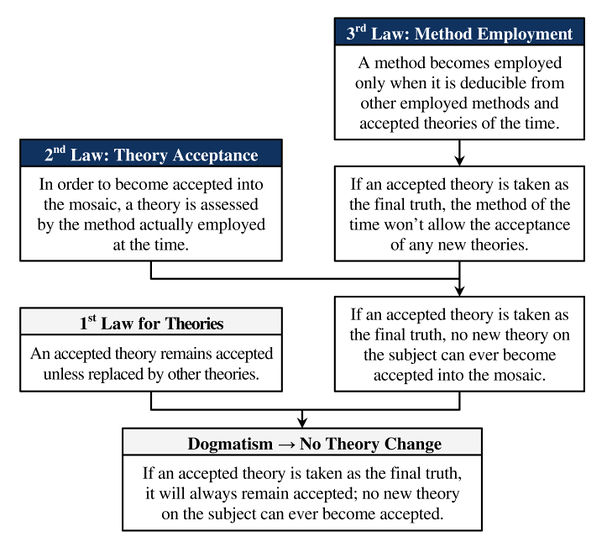Difference between revisions of "Dogmatism No Theory Change theorem (Barseghyan-2015) Reason1"
Jump to navigation
Jump to search
Izzy Friesen (talk | contribs) |
Izzy Friesen (talk | contribs) |
||
| Line 7: | Line 7: | ||
|Formulated Year=2015 | |Formulated Year=2015 | ||
|Description=Suppose a community has an accepted theory that asserts that it is the final and absolute truth. By the [[The Third Law (Barseghyan-2015) |Third Law]] we deduce the method: accept no new theories ever. By the [[The Second Law|Second Law]] we deduce that no new theory can ever be accepted by the employed method of the time. By the [[The First Law (Barseghyan-2015)|First Law]], we deduce that the accepted theory will remain the accepted theory forever[[CiteRef::Barseghyan (2015)|p. 165-167]]. | |Description=Suppose a community has an accepted theory that asserts that it is the final and absolute truth. By the [[The Third Law (Barseghyan-2015) |Third Law]] we deduce the method: accept no new theories ever. By the [[The Second Law|Second Law]] we deduce that no new theory can ever be accepted by the employed method of the time. By the [[The First Law (Barseghyan-2015)|First Law]], we deduce that the accepted theory will remain the accepted theory forever[[CiteRef::Barseghyan (2015)|p. 165-167]]. | ||
| + | |||
| + | {{PrintDiagramFile|diagram file=Dogmatism-theorem.jpg}} | ||
|Resource=Barseghyan (2015) | |Resource=Barseghyan (2015) | ||
}} | }} | ||
Revision as of 20:33, 10 February 2023
Suppose a community has an accepted theory that asserts that it is the final and absolute truth. By the Third Law we deduce the method: accept no new theories ever. By the Second Law we deduce that no new theory can ever be accepted by the employed method of the time. By the First Law, we deduce that the accepted theory will remain the accepted theory forever1p. 165-167.
This reason for Dogmatism No Theory Change theorem (Barseghyan-2015) was formulated by Hakob Barseghyan in 2015.1
